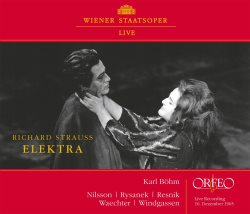|

|
Richard STRAUSS (1864-1949)
Elektra (1908) [98:40]
(Libretto by Hugo von Hofmannsthal, based on the drama Electra by Sophocles)
Elektra – Birgit Nilsson (soprano)
Chrysothemis – Leonie Rysanek (soprano)
Klytämnestra – Regina Resnik (mezzo)
Aegisth – Wolfgang Windgassen (tenor)
Orest – Eberhard Waechter (baritone)
Der Pfleger der Orest – Friedrich Guthrie (bass)
Vertraute – Margareta Sjöstedt (soprano)
Schleppträgerin – Margarita Lilowa (soprano)
Junger Diener – Gerhard Unger (tenor)
Alter Diener – Herbert Lackner (bass)
Aufseherin – Dania Mastilovic (soprano)
Fünf Mägde – Margarita Lilowa (soprano); Margareta Sjöstedt (soprano); Margareta Ast (mezzo); Gundula Janowitz (soprano); Gerda Scheyrer (soprano).
Orchester und Chor der Wiener Staatsoper/Karl Böhm
rec. live, 16 December 1965, Wiener Staatsoper. mono
ORFEO C886142I [60:31 + 38:09]
Given the established supremacy of Solti’s 1966-67 studio recording featuring two of the principals here, it would be unreasonable to recommend this live, mono, radio broadcast over that landmark issue. However, despite the low transfer level and muddier sound, it has many things going for it, not least the extra intensity and charge which the atmosphere of a live performance can bring. There's also the presence of Leonie Rysanek in a role she owned for thirty years. Furthermore, Karl Böhm was always at his best in live Strauss and this is no exception. It contains the two sizeable cuts standard at the time in “Wie stark du bist du” up to “Sei verflucht”, when Elektra is attempting to recruit her sister into participating in her murderous schemes and that track of 4:27 has been accidentally missed off the liner notes; no matter, the music is present on disc.
Rysanek gives us a much more powerful and impassioned Chrysothemis than Marie Collier’s weaker, more vulnerable creature for Solti; she swoops a bit but is extraordinary in the climax. Nilsson simply has no equal in the role, from the searing top C on “königliche” in her first aria to the delicate ppp A flat on “Göttin” when she is sweet-talking Klytämnestra, this is a tour de force. Resnik is equally affecting as the anguished, guilt-wracked queen, the tessitura of the role lying right in the meat of her voice, allowing her to exploit the dark resonance of her lower register. Good as she is for Solti, she finds an extra frisson here and the results are chilling. Waechter is surprisingly fine as Orest, as he is able to find darker places in his baritone to convey the character’s implacable determination. The intensity of Böhm’s conducting is memorable, especially Elektra’s final, frenzied ecstatic dance.
Despite the low level, the sound is clear for enough for us to hear instrumentalists turning the pages of the score. The VSO strings are occasionally a little sour but that does not matter in a score as violent as this. What is important is that the score should thrill and chill.
Ralph Moore
 |
 |
|











